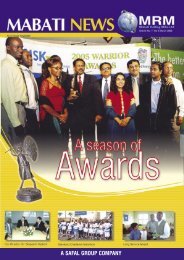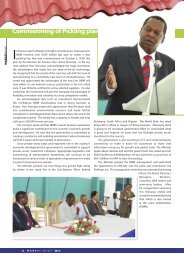Create successful ePaper yourself
Turn your PDF publications into a flip-book with our unique Google optimized e-Paper software.
Christmas<br />
As a Christian kid, I grew up amongst the Hindu and Muslims. I<br />
always enjoyed the celebration; the Diwali fire crackers lighting<br />
up the sky, the delicious pilau at the end of Ramadhan and finally all<br />
the Christmas goodies.<br />
But did I know what do all these people celebrate or observe?<br />
Being a Christian I thought I knew the meaning of Christmas! The<br />
birth of Jesus, Father Christmas and a day to wear new clothes!<br />
Today, reflect on the real meaning of all these celebrations<br />
including what I thought I knew - Christmas.<br />
Christmas: Christmas literally means the Mass (celebration) of<br />
Christ. “Christ” is a Greek word and title meaning “anointed” or one<br />
set apart by God for a special purpose - to deliver of the people from<br />
sin.<br />
Jesus was born in a humble stable, into a poor family. Simple<br />
shepherds were the first to witness this event. In this poverty<br />
heaven's glory was made manifest.<br />
Christians believe that it was exactly God’s plan<br />
that things happened this way. They say that<br />
it shows that Jesus came as a humble, poor<br />
person and not as a strong, rich king.<br />
The birth of Jesus was told many years<br />
before in the books of the prophets Micah<br />
and Isaiah.<br />
D<br />
Diwali<br />
iwali is the most well-<br />
D<br />
known of all Indian festivals.<br />
It is a five-day festival which occurs on the<br />
fifteenth day of Kartika (First month).<br />
During this festival, colloquially<br />
known as the “Festival of Lights”, homes<br />
are thoroughly cleaned and windows are<br />
opened to welcome Lakshmi, goddess<br />
of wealth. Candles and oil lamps (divas)<br />
are lit as a greeting to Lakshmi. The lights also illuminate the<br />
darkness of the New Year’s moon and strengthen our close<br />
friendships and knowledge<br />
Gifts such as sweets are exchanged and meals are<br />
prepared. The festival is invariably accompanied by<br />
explosion of fireworks. Everywhere, it signifies the renewal<br />
of life and, accordingly, it is common to wear new clothes<br />
on the day of the festival. Similarly, it heralds the approach<br />
of winter and the beginning of the sowing season.<br />
The<br />
Great<br />
Religious<br />
Festivals<br />
In reality, every day the real image of<br />
Christmas is exposed. As God looked down<br />
from heaven with compassion on His human<br />
creation, He sent Jesus to become like us so that<br />
through His obedience we would have the opportunity of living a life<br />
of forgiveness and hope.<br />
Scriptures say that because God so loved His people, He sent His<br />
only Son Jesus so that His people could be saved and in turn love<br />
Him (see John 3:16).<br />
The image of “people” is not one that often comes to our mind<br />
when we celebrate Christmas. But it should be. This was the image<br />
God saw when He sent Jesus to be born in that manger in Bethlehem.<br />
He saw the image of you, me and countless others who are lost,<br />
hopeless and in need of salvation.<br />
It was because of His love for what He saw that God sent His<br />
Son.<br />
As you set up your nativity scene this Christmas and as<br />
you arrange the shepherds, angels, barn animals and<br />
other figurines in the stable, don’t forget to include a<br />
portrait of yourself. After all, this was the image God<br />
saw when He looked down on Bethlehem that first<br />
Christmas day.<br />
E id-ul-Fitr<br />
Eid-ul-Fitr’<br />
id-ul-Fitr is one of the most important festivals in<br />
Islam celebrated by Muslims all over the world with<br />
great joy and festivities.<br />
‘Eid‘ means ‘a recurring happiness or festivity’ and ‘fitr’<br />
means to ‘to begin’. ‘Iftar’ means’the breaking of the fast’ and it is<br />
from this that the name ‘Eid-ul-Fitr’ seems to have been taken which<br />
means ‘festival of the breaking of the fast’.<br />
‘Eid-Ul-Fitr’ falls on the first day of Shawwal, the 10th month of the<br />
Muslim calendar, and marks the end of the fasting observed by the<br />
Muslims during the month of Ramadhan.<br />
Fasting was prescribed as an act of self-denial with a view to<br />
attaining moral and spiritual upliftment.<br />
While “Eid-ul-Fitr” is an occasion for joy and<br />
happiness, it is certainly not an occasion for<br />
over-eating, frivolity or for the pursuit of pleasure.<br />
The joy on this occasion is the spiritual joy of<br />
fulfillment.<br />
‘Eid-ul-Fitr’ also occasions an opportunity for the<br />
believers to forget all grudges and ill-feelings towards<br />
one another and start afresh in the brotherly spirit that<br />
Islam preaches.<br />
The underlying message of this happy occasion is<br />
that the believers fulfill God’s command of discipline<br />
and holiness<br />
MABATINEWS<br />
Christmas, Idd-ul- Fitr, Diwali .........<br />
so what do all these religious observance mean?<br />
The Hindu say ... 'Diwali signifies the renewal of life'<br />
The Muslims say.... The underlying message of Eid-El-Fitr is<br />
that the believers fulfil God’s command of discipline and<br />
holiness'.<br />
The Christians say..... 'With Christmas, He sent Jesus to become<br />
like us so that through His obedience we would have the<br />
opportunity of living a life of forgiveness and hope'.<br />
What do you make out of this!<br />
God bless you all!<br />
By Austin Okoda<br />
M A B A T I N E W S 13









